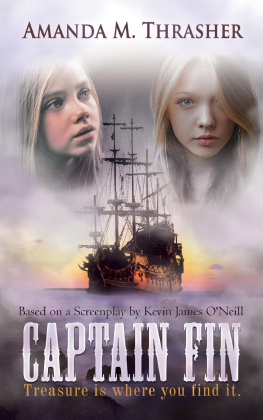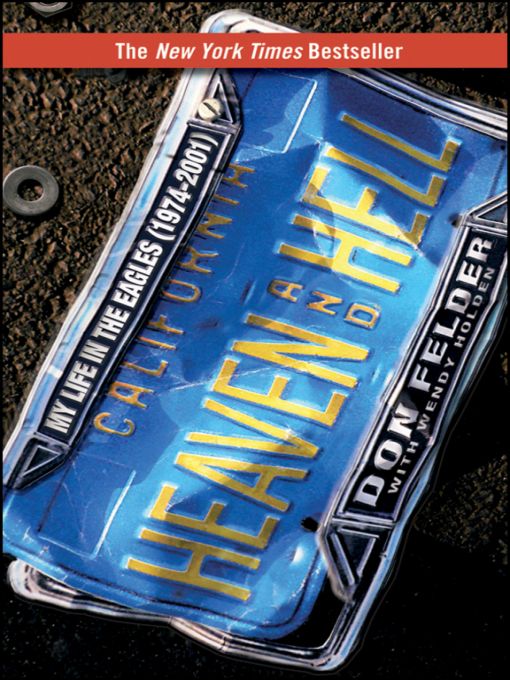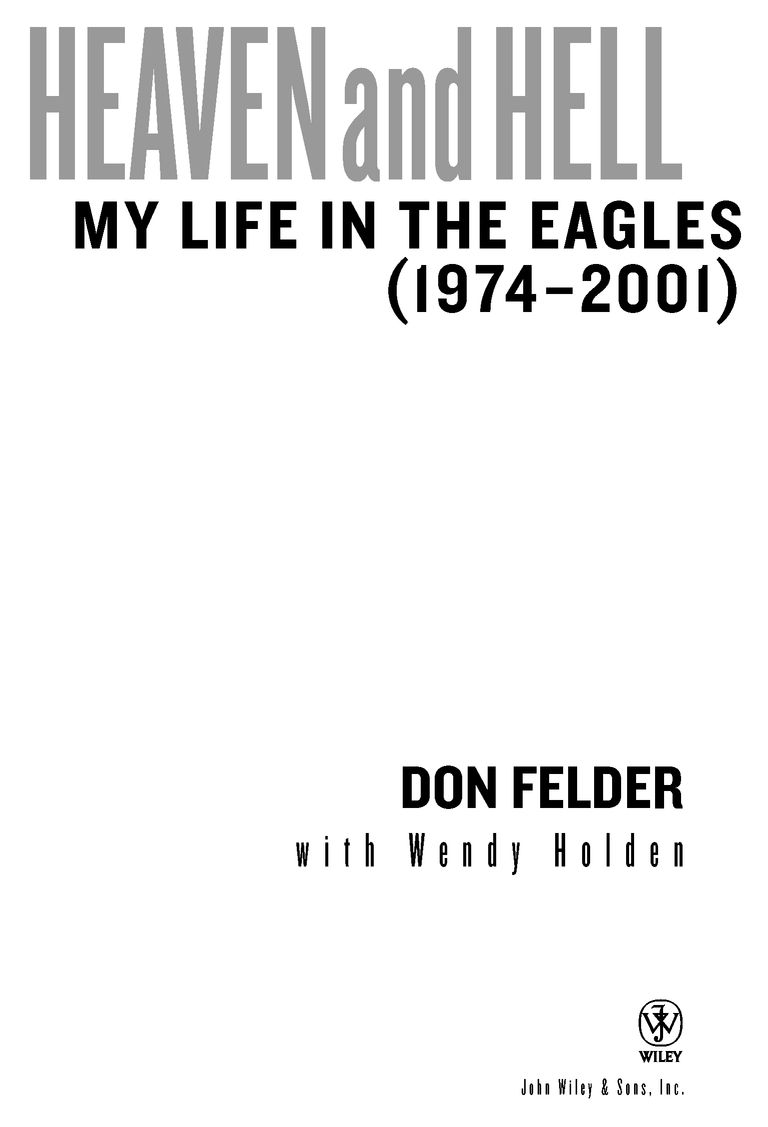Table of Contents
To
my mother and father
and
all those who dream of making it
in the music business.
ACKNOWLEDGMENTS
I am indebted to so many people who have helped me over the years, and I fear that my memory might fail me. Frankly, the exact details of some events in the seventies have long since left my consciousness. If Ive made any mistakes, misquoted or overlooked anyone, then please forgive me.
My thanks go to Susan Felder for sticking it out through all those years; my children, Jesse, Rebecca, Cody, and Leah; Jerry and Marnie Felder; Buster Lipham for allowing me to charge my instruments and for supporting me in the beginning; the members of the Continentals and Flow; Stephen Stills; Bernie Leadon; the Allman Brothers; Creed Taylor; Paul Hillis for teaching me music theory; Fred Walecki; David Geffen; David Blue; Graham Nash; David Crosby; Randy Meisner; Joe Walsh; Timothy B. Schmit; Bill Szymczyk; J.D. Souther; Larry Scoop Solters; the late Isa Bohn; and all the road crews during the entire trip. Also to John Belushi, Joel Jacobson, Linda Staab, Skip Miller, Barry Tyerman (for supporting me through it all), Jackson Browne (for standing in for me when my son was born), Cheech and Chong, Jack Pritchett, and Jimmy Pankow and the Bass Patrol, not to mention B.B. King.
Alan Nevins, my literary agent, and Calvin Warzecha (for the best fried oysters Ive had since my dad passed away), the people at Wiley, and all those I have left out who should be included here.
Wendy Holden for wrapping herself in my life while hers was in such pain.
Kathrin Nicholson for loving me through it all.
Don Felder
Without Alan Nevins this book would never have happened. Without Calvin Warzecha, there would be no Alan Nevins. I am indebted to them both for their professionalism, generous hospitality, and cherished friendship. My husband, Chris, has held my hand through this and so much more; Id have drowned without him. My friend Robin Richardson has been a source of great comfort and strength, as have my siblings. I shall miss my wonderful parents, Ted and Dorothy Holden, more than words can say.
Don and Kathrin welcomed me into their lives and their home with open arms and made one of the worst years of my life somehow bearable. Thank you.
On a professional front, I am grateful to Ronin Ro for the work he did in the beginning and Marc Eliot for his brave book To the Limit: The Untold Story of the Eagles. Where Dons memory had failed him, Marcs text was able to prompt some answers. I also need to thank Marc Shapiro for The Long Run, Ben Fong-Torres for Not Fade Away, Cameron Crowe for the inimitable Almost Famous, John Einarson for Desperados: The Roots of Country Rock, Dave Zimmer for Crosby, Stills & Nash, Anthony Fawcett for California Rock, California Sound, William Knoedelseder for Stiffed: A True Story of MCA, the Music Business, and the Mafia, and John Swenson for Headliners. Also thanks to Randy Meisner for lunch, Karima Ridgley and Mindy Stone for their infinite patience and efficiency, and to Stephen S. Power and all at Wiley for their vision.
Wendy Holden
ONE
We could hear the rumble of the crowd in the dressing room. It sounded like a thunderstorm brewing somewhere far above us. As we emerged one by one from the bowels of the stadium, our lips wet with beer, white powder rings around my nostrils, the rumble grew louder and louder.
The stage was dark as we fumbled across to our respective instruments with well-practiced skill, the cool wind ruffling our hair. The murmur suddenly swelled. Those at the front of the crowd spotted our shadowy figures moving around in the red glow of the amplifiers. They lit candles or cigarette lighters and held them above their heads, hoping for an early glimpse of their rock idols. Others followed in sequence until all we could see was a vast, shimmering sea of light. The anticipation was so heady we could almost taste it.
We stood in the half-light for a few seconds, catching our breath, trying to focus our minds on who we were and how we came to be there. Me, a poor boy from small-town Florida, almost crippled by polio as a child, whose dream was to play like B.B. King, stepping out to the front of the stage. The other four members of the band behind me, from all over the country, in bell-bottom jeans, each of us the living embodiment of the American dream.
There we stood, peering out at the tens of thousands of expectant fans whod paid top dollar to be here, people who knew each note, every word of our music and whod come from miles around just to hear us play. The cocaine and the thrill and the adrenaline made my heart pound hard against my ribcage.
Suddenly a spotlight flicked on. Shining straight down on me, standing alone in a beam of brilliant light, holding a white, double-necked Gibson guitar. The rest of the band silhouetted against a giant reproduction of the distinctive cover photograph of Hotel California, an image of the Beverly Hills Hotel flanked by palm trees in the L.A. sunset. My fingers tingling, I opened with the first distinctive bars of the title track, a song Id cowritten a few months before, sitting cross-legged on the floor of my beach house with my son playing nearby.
A roar went up. Nobody expected this to be the first number. They thought wed close with it. The audience exploded. For those first few seconds, there was no sound but that of the crowda deafening cacophony of screaming, cheering, bellowing, whistling, and tumultuous applause. Swaying in the spotlight, soaking up the intense, electrically charged atmosphere, I wiped the sweat from my forehead and closed my eyes. As my fingers moved automatically up and down the frets, I allowed myself a small smile. This was it. All that Id ever dreamed of in the depths of the nightto hear those voices calling from far awaythe exhilarating sound of success.
TWO
Gainesville, Florida, probably wasnt the ideal place to grow upor at least not the poorer quarter, where we lived. When I was a child, it was an unassuming Deep South community once called Hogtown Creek, where the only means of escape was through dreaming, something I became especially good at.
Its chief attraction was its location, slap bang in the middle of the Sunshine State, three hours from the capital, Tallahassee. It was a ninety-minute drive from Daytona Beach to the east and from the Gulf of Mexico to the west, and about two hours from Orlando, which was nothing until Mr. Disney decided to move there in the seventies. Gainesvilles saving grace was the University of Florida, which for some reason chose to base itself there in 1905, bringing in thousands of people. Hogtown Creek was never the same.
The climate was hot and swampy, the air thick with mosquitoes. In the winter, it was dispiritingly cold and wet. But it was the kind of place where homeowners never had to lock their doors; crime was virtually non-existent. Held in a sort of rose-tinted time warp, it was populated by good, wholesome folks who bred decent kids with strong moral values, helped along by a little healthy Bible-thumping. The Yearling, with Gregory Peck and Jane Wyman, always reminds me of my hometown, with its sugary, apple-pie sweetness. It came as no surprise that Marjorie Kinnan Rawlings, the author of










